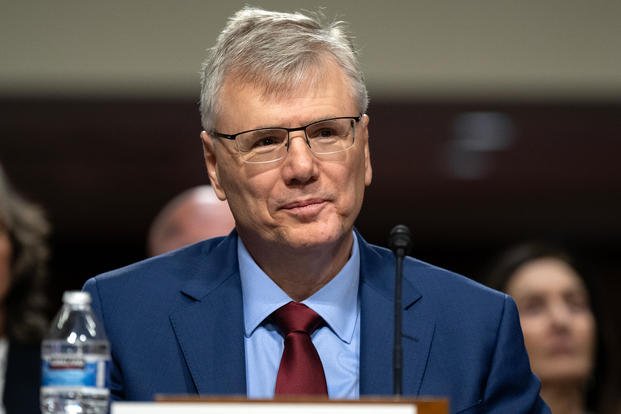The Air Force has a new civilian leader after the Senate confirmed President Donald Trump's pick to be Air Force secretary, giving the Trump administration a full slate of service secretaries.
On Tuesday afternoon, the Senate voted 74-25 to confirm Troy Meink, who has been principal deputy director of the National Reconnaissance Office since 2020.
Unlike Trump's other service secretaries, Meink brings an extensive military background to the role, garnering him considerable bipartisan support despite some questions that arose during the confirmation process about potential conflicts of interest. Still, all 25 "no" votes came from Democrats.
Read Next: Trump Orders VA to Build Homeless Veterans Center on West LA Campus
With a recent history of focusing on space policy, Meink's selection was seen as a sign of Trump's elevation of space in national security policy. As the head of the Department of the Air Force, Meink will also oversee the Space Force, the creation of which Trump considers a signature achievement of his first term in office.
During his confirmation hearing, Meink made clear that growing the 5-year-old Space Force is one of his top priorities.
"Space is critical. This is actually one of the areas that we're most challenged, I believe, from the rapidly evolving threat from China and others," Meink said at his confirmation hearing in March. "I think the key to both acquisition and operations is making sure you have the best talented workforce. These are some of the most complicated systems and, if the U.S. is going to maintain our advantage, which we need to do in space, we need to make sure we have the right workforce."
One of the first tasks facing Meink now that he's confirmed is a decision on the home of the Space Command headquarters, which has been at the center of a four-year battle between Alabama and Colorado politicians. Alabama lawmakers have said they expect Trump will move the headquarters to their home state, reversing former President Joe Biden's decision to keep it in Colorado.
As Air Force secretary, Meink will also play a key role in shepherding Trump's Golden Dome project, the ill-defined concept for a space-based missile defense shield over the U.S.
Another major program on his plate will be the Air Force's first sixth-generation fighter jet, which entered a critical phase this year with the awarding of a contract to Boeing to build the aircraft.
Meink joined the Air Force through the Reserve Officers' Training Corps program at South Dakota State University in 1988. His military career also included time as a KC-135 Stratotanker navigator and instructor and as a lead test engineer for the Missile Defense Agency.
In between his current role at the National Reconnaissance Office, or NRO, and a previous stint there, he served as deputy under secretary of the Air Force for space during the Obama administration. As principal deputy director of the NRO, he has been responsible for day-to-day management of the office that oversees the U.S. intelligence community's network of spy satellites.
During the confirmation process, Meink faced questions about allegations of favoritism toward SpaceX, the company and government contractor owned by billionaire Trump adviser Elon Musk.
In February, Reuters reported that a government watchdog investigated allegations that Meink used his role at the NRO to steer a multibillion-dollar contract toward SpaceX.
In written answers to the Senate Armed Services Committee, Meink also revealed that Musk sat in on his interview for the Air Force secretary job, Politico reported last month.
Two Democratic members of the Senate Armed Services Committee pressed Meink on the Reuters report in a letter ahead of his confirmation hearing, but concerns about any ties to Musk were not raised at the hearing itself.
Related: Signal Scandal Overshadows Confirmation Hearing for Air Force Secretary, Other Top Pentagon Nominees












